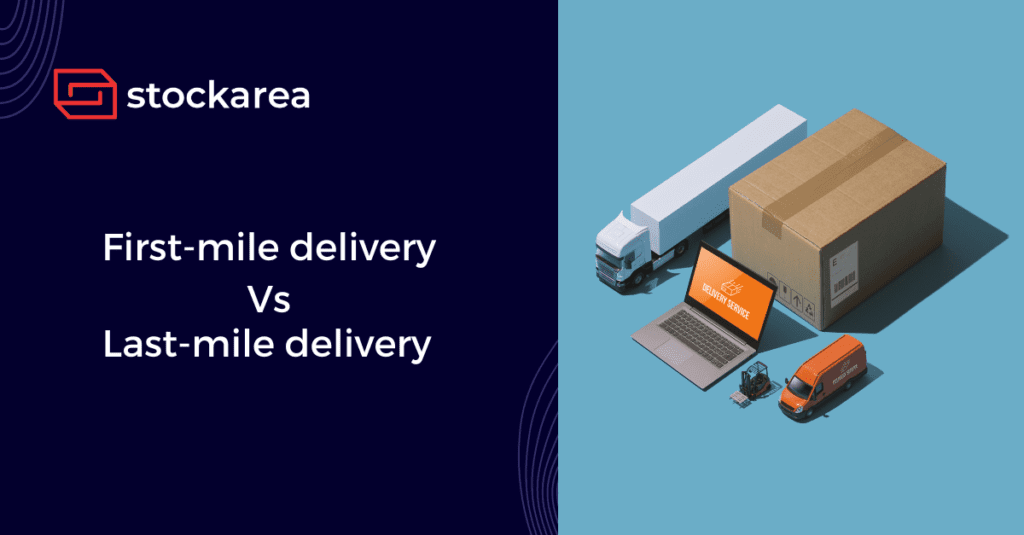First-mile and last-mile delivery are the most essential processes in the supply chain as they signify the beginning and end of the fulfilment process. These two legs of the delivery process, along with middle-mile delivery, co-depend on each other to ensure the smooth operation of the delivery process.
Companies rely heavily on first and last-mile delivery for consumer satisfaction, safe shipment of products, along with profitability. However, both of these processes serve different purposes and operate differently.
What is First-mile and Last-mile delivery?
In simple terms, first-mile delivery is the beginning of the fulfilment and delivery process, where the products are transported from their origin to the first inventory hub. First-mile delivery determines the flow of the delivery process, and a minor disruption can collapse the entire fulfilment operation.
On the other hand, last-mile delivery is the final step of the delivery process, which includes the delivery of the products directly to the consumer from the fulfilment centre. Any disruption in the last-mile delivery can be very detrimental to the overall cost as it increases the chances of returns and poor customer experience.
Differences between first-mile and last-mile delivery
1. Shipment Size
The size of a shipment varies vastly when it comes to first-mile and last-mile deliveries. In the case of first-mile deliveries, the packages are usually transported in pallet-sized shipments. While in the case of last-mile delivery, orders are directly delivered to the consumer from the fulfilment centre in smaller individual packages.
2. Packaging
In first-mile delivery, since the packages are transported in bulk, companies often use unbranded packaging to ship to the warehouse. In last-mile delivery, the products reach directly to the consumers. Therefore, most of the time, last-mile companies tend to use branded packaging. These packages include precise serial numbers, unique item barcodes and invoices that contain information about the customer for authentication purposes.
3. Significance in E-commerce
Due to the growing popularity of e-commerce, first-mile and last-mile delivery services are more in demand than ever. First-mile delivery acts as a channel between the supplier and the last-mile service. Any problems or delays in the first-mile service will disrupt the entire chain of events of the fulfilment process, directly affecting the e-commerce company.
Last-mile delivery services are more customer-centric. Therefore, the main focus for last-mile operations is catering to consumer satisfaction. Any problems with last-mile service increase the chances of returns, cancellations, and failed deliveries, an added expense to the e-commerce company.
4. Cost
Last-mile delivery makes up for more than half of the supply chain costs because there are many processes involved in last-mile delivery to provide top-tier service and meet customer expectations. Last-mile services need to come up with innovative solutions to keep consumers satisfied. However, the expenses are also due to challenges faced in the industry. Therefore, reducing costs is crucial to maintaining profitability in last-mile delivery.
However, first-mile delivery is comparatively less expensive than last-mile delivery because its operations are far more straightforward. Hence, not many companies work on finessing their first-mile service, which is why it accounts for lower costs than last-mile delivery.
5. Visibility
Last-mile services provide end-to-end visibility to consumers. They use real-time tracking and GPS services to provide live updates and constant notifications to consumers about their packages. On the other hand, lack of visibility is a significant challenge that first-mile delivery faces. Poor visibility in the first-mile industry is mainly caused due to inefficient tracking of packages from manufacturer to the warehouse as it is considered superfluous.
Conclusion
It is essential to understand that first-mile and last-mile logistics are equally crucial for the smooth functioning of supply chain management. First-mile delivery sets the foundation, and last-mile is responsible for the end result. It is important to pay close attention to both of these services to yield optimum results. Streamlining these processes can help optimise costs, provide better customer service, and give companies a good profit margin.
Related posts
- 8 Proven Ways to Reduce Last-Mile Delivery Cost
- How to Choose the Right E-commerce Fulfilment Partner for Your Business
- 7 Major Challenges Of Last-mile Delivery
- Top 11 E-commerce Fulfillment Companies In India
- Top 10 E-commerce Fulfillment Companies In Delhi
- Top 11 E-commerce Fulfillment Companies In Hyderabad
- Top 10 E-commerce Fulfillment Companies In Kolkata
- What is Last Mile Delivery?
- What Is A Shipping Label?
- How Can Technology Improve Last-Mile Delivery?
- 6 Key Benefits Of Printing Shipping Labels
- Walmart Supply Chain Management Analysis
- Omnichannel Fulfillment Vs Multichannel Fulfillment
